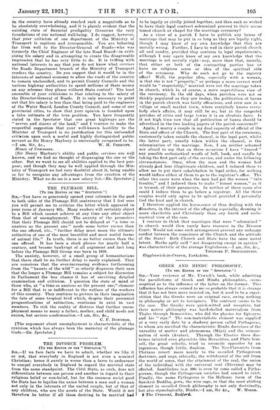THE DIVORCE PROBLEM.
(To THE EDITOR OF THE " SPECTATOR."]
Sia,—If we face facts we have to admit, whether we like it or not, that everybody in England is not even a nominal Christian; hence it surely is worse than a farce to endeavour to compel everybody in England to regard the married state from the same standpoint. The Civil State, as such, does not differentiate between one person and another in regard to their religious belief or non-belief, but for the common social good the State has to legalize the union between a man and a woman not only in the interests of the united couple, but of that of any children, who are the assets of the State. Would it not therefore be better if all those desiring to be married had to be legally or civilly joined together, and then such as wished to have their legal contract solemnized proceed to their accus- tomed church or chapel for the marriage ceremony?
As a vicar of a parish I have to publish any banns of marriage that may be put in so long as they are legally right. though I may know of my own knowledge that they are morally wrong. Further, I have to wed in their parish church all and sundry, provided they conform to legal requirements, although I may again know of my own knowledge that the marriage is not morally right—nay, more than that, namely. that either or both of the contracting parties has or have no religious sense or idea of the spiritual side of the ceremony. Why do such not go to the registry office? Well, the popular idea, especially with a woman, is that she is not " properly," or perhaps a more correct word would be " respectably," married were not the marriage taken in church, which is, of course, a mere superstitious view of the ceremony. In the old days, when parishes were not so thickly populated as they are to-day, the publication of banns in the parish church was fairly efficacious, and even now in a village or small market town, where everybody knows every- body else's affairs, it may still be so; but in the congested parishes of cities and large towns it is an absolute farce. Is it not high time now that all publication of banns should be advertised in the two leading papers of the parish concerned?
Again, 1 marry a couple in my dual capacity of official of the State and officer of the Church. The first part of the ceremony. customarily taken outside the chancel, is the legal part, whilst the latter part, usually taken within the chancel, is the solemnization of the marriage. Now, I am neither ashamed nor afraid to say that on three occasions I have " braved " any possible ecclesiastical wrath of bell, book, and candle by taking the first part only of the service, and under the following circumstances. Once, when the man and the woman had already obad four illegitimate children, and I induced them to allow me to put their cohabitation in legal order, for nothing would induce either of them to go to the registrar's office. The other two cases were when the men had got the women " into trouble," and I induced them to make " honest women," as it is termed, of their paramours. In neither of these cases also could I induce them to go before a registrar. All the three couples would only agree to be spliced provided I personally tied the knot and in church.
I therefore applied the horse-sense of thus dealing with the disasters, in the interest of the offspring especially, deeming it more charitable and Christianly than any harsh and eccle- siastical view of the case.
I venture to think that marriages that were "solemnized " in church would then rarely have recourse to the Divorce Court. Would not some such arrangement prevent any unhappy conflict between the conscience of the Church and the attitude of the State? Both Church and State have the same moral intent. Burke aptly said " not disagreeing except in opinion " was characteristic of the average Englishman.—I am, Sir, &c., THEODORE P. BROCKLEHURST. Gigglestrick-in-Craven, Yorkshire.


































 Previous page
Previous page